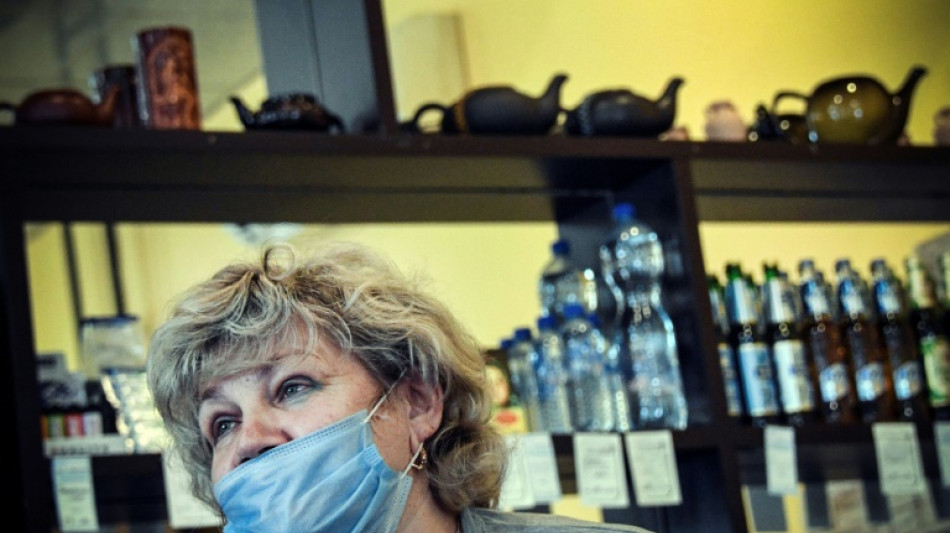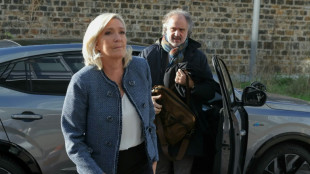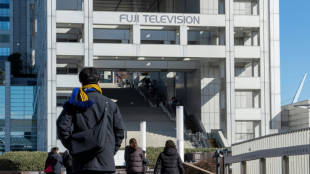
-
 French court hands Le Pen five-year election ban
French court hands Le Pen five-year election ban
-
Probe accuses ex J-pop star Nakai of sexual assault

-
 Japan leads hefty global stock market losses on tariff woes
Japan leads hefty global stock market losses on tariff woes
-
Saka 'ready to go' after long injury lay-off: Arteta

-
 Ingebrigtsen Sr, on trial for abusing Olympic champion, says he was 'overly protective'
Ingebrigtsen Sr, on trial for abusing Olympic champion, says he was 'overly protective'
-
Tourists and locals enjoy 'ephemeral' Tokyo cherry blossoms

-
 Khamenei warns of 'strong' response if Iran attacked
Khamenei warns of 'strong' response if Iran attacked
-
France fines Apple 150 million euros over privacy feature

-
 UK PM urges nations to smash migrant smuggling gangs 'once and for all'
UK PM urges nations to smash migrant smuggling gangs 'once and for all'
-
Thai authorities probe collapse at quake-hit construction site

-
 France's Le Pen convicted in fake jobs trial
France's Le Pen convicted in fake jobs trial
-
Chinese tech giant Huawei says profits fell 28% last year

-
 Trump says confident of TikTok deal before deadline
Trump says confident of TikTok deal before deadline
-
Myanmar declares week of mourning as hopes fade for quake survivors

-
 Japan's Nikkei leads hefty market losses, gold hits record
Japan's Nikkei leads hefty market losses, gold hits record
-
Tears in Taiwan for relatives hit by Myanmar quake

-
 Venezuela says US revoked transnational oil, gas company licenses
Venezuela says US revoked transnational oil, gas company licenses
-
'Devastated': Relatives await news from Bangkok building collapse

-
 Arsenal, Tottenham to play pre-season North London derby in Hong Kong
Arsenal, Tottenham to play pre-season North London derby in Hong Kong
-
Japan's Nikkei leads hefty equity market losses; gold hits record

-
 Israel's Netanyahu picks new security chief, defying legal challenge
Israel's Netanyahu picks new security chief, defying legal challenge
-
Trump says US tariffs to hit 'all countries'

-
 Prayers and tears for Eid in quake-hit Mandalay
Prayers and tears for Eid in quake-hit Mandalay
-
After flops, movie industry targets fresh start at CinemaCon

-
 Tsunoda targets podium finish in Japan after 'unreal' Red Bull move
Tsunoda targets podium finish in Japan after 'unreal' Red Bull move
-
French chefs await new Michelin guide

-
 UK imposes travel permit on Europeans from Wednesday
UK imposes travel permit on Europeans from Wednesday
-
At his academy, Romanian legend Hagi shapes future champions

-
 Referee's lunch break saved Miami winner Mensik from early exit
Referee's lunch break saved Miami winner Mensik from early exit
-
Djokovic refuses to discuss eye ailment after shock Miami loss

-
 Mitchell magic as Cavs bag 60th win, Pistons and T'Wolves brawl
Mitchell magic as Cavs bag 60th win, Pistons and T'Wolves brawl
-
Mensik shocks Djokovic to win Miami Open

-
 Duterte lawyer: 'compelling' grounds to throw case out
Duterte lawyer: 'compelling' grounds to throw case out
-
What happens on Trump's 'Liberation Day' and beyond?

-
 Clock ticks on Trump's reciprocal tariffs as countries seek reprieve
Clock ticks on Trump's reciprocal tariffs as countries seek reprieve
-
Japan-Australia flagship hydrogen project stumbles

-
 Musk deploys wealth in bid to swing Wisconsin court vote
Musk deploys wealth in bid to swing Wisconsin court vote
-
Mensik upsets Djokovic to win Miami Open

-
 China manufacturing activity grows at highest rate in a year
China manufacturing activity grows at highest rate in a year
-
'Waited for death': Ex-detainees recount horrors of Sudan's RSF prisons

-
 Japan's Nikkei leads big losses in Asian markets as gold hits record
Japan's Nikkei leads big losses in Asian markets as gold hits record
-
Rescue hopes fading three days after deadly Myanmar quake

-
 'Basketbrawl' as seven ejected in Pistons-Wolves clash
'Basketbrawl' as seven ejected in Pistons-Wolves clash
-
Four men loom large in Microsoft history

-
 Computer pioneer Microsoft turns 50 in the age of AI
Computer pioneer Microsoft turns 50 in the age of AI
-
Trump calls out both Putin and Zelensky over ceasefire talks

-
 Kim Hyo-joo tops Vu in playoff to win LPGA Ford Championship
Kim Hyo-joo tops Vu in playoff to win LPGA Ford Championship
-
Economy and especially Trump: Canadians' thoughts on campaigns

-
 Liberal PM Carney takes lead four weeks before Canada vote
Liberal PM Carney takes lead four weeks before Canada vote
-
SpaceX to launch private astronauts on first crewed polar orbit


Russians split from family in Ukraine strive to maintain ties
Before conflict broke out, visiting her brother and sister was easy for Alla Lavrova, who could drive from her home in Russia and across the border to Ukraine in just one hour.
But with tensions soaring after Western leaders accused Moscow of amassing tens of thousands of troops on the border with Ukraine, Lavrova, 56, doesn't know when she'll see her siblings again.
"I haven't seen them for two-three years," she says, wiping the counter of her cafe in the town of Oktyabrsky in southwestern Russia.
"It has become more difficult to cross the border because of the political situation," she tells AFP.
Many residents of this small town have had to adapt to keep in touch with loved ones since 2014, after an insurgency of Russia-backed separatists in eastern Ukraine.
Crossing the border to work, shop or visit family used to be easy but now the process has become a headache with further restrictions introduced with the coronavirus pandemic.
And the situation is unlikely to change soon with Washington warning of an imminent Russian invasion into Ukraine.
"I am sorry that Russia and Ukraine have developed such relations," Lavrova says, casting a disapproving glance at the muddy footsteps her customers left.
"We ordinary people have warm, human relationships. But at the highest level -- it's different," she adds.
- Easier to visit Peru -
Like Lavrova, many families in this region have relatives in Kharkiv, Ukraine's second largest city just 30 kilometres (18 miles) from the border with Russia.
Her brother and sister studied and eventually settled there during Soviet times, taking up Ukrainian citizenship after the USSR collapse in 1991.
Until 2014, the siblings would see each other regularly, especially at Easter -- an important holiday in both Orthodox Russia and Ukraine.
Now they only speak by phone.
"They can't even come and say a prayer at our parents' grave," Lavrova says.
Crossing the border is still possible for Russians but it comes with tedious administrative procedures that discourage many to even try.
Sofia Vinakova, a 22-year-old student, says she missed her grandmother's funeral in Ukraine's capital Kyiv last September.
"Only my mother could go," she says, taking a sip of her strawberry vodka.
Dmitry Popov tells AFP he tried to visit his cousins in Kharkiv in 2019, but Ukrainian authorities refused him entry.
Young men are often subject to extensive checks with Kyiv authorities fearing the infiltration of Russian soldiers.
"It's easier to visit Peru," says 22-year-old Popov, who keeps in touch with his relatives in Ukraine by playing online video games together.
- Avoid politics -
Vinakova says she remains in contact with her aunt in Ukraine through video calls, but they don't mention the conflict.
"In Ukraine they say it's Russia's fault. Here, it's the opposite. We came to the conclusion that talking about it would be useless," Vinakova says. "Politics is politics. We are family".
While most of the residents in the border region who spoke to AFP said they do not believe there will be a military confrontation, some are concerned for their relatives in Ukraine.
Vladimir Sidletsky, a 70-year-old retired electrician, says he has an older sister living in Lugansk, one of the two breakaway regions in eastern Ukraine controlled by separatists.
"We are worried about her. We told her to come and join us because of the situation there," Sidletsky tells AFP as he puts down his heavy shopping bag and pulls up the collar of the jacket to shield himself from the cold.
"But she doesn't want to," he says.
"We'll hold on. We survived 1941. We'll get through this too" is what his sister says.
Despite the difficulties, Vinakova remains positive and certain that she will see her Ukrainian aunt again.
If necessary, "we'll meet in a third country," she says.
D.Moore--AMWN